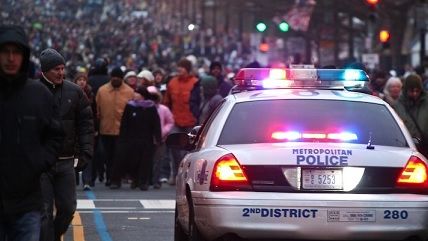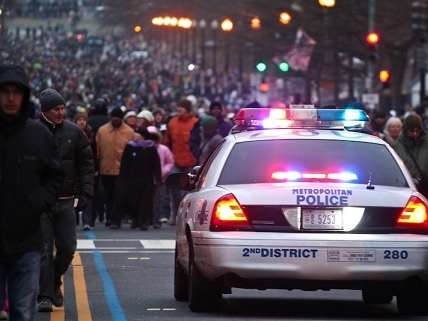Survey of Police Finds Most Cops Believe Protesters Motivated by Anti-Police Sentiment, Incidents of Police Violence Are Isolated
Also finds unsurprising racial disparities in police attitudes


A new wide-ranging survey of police officers around the country from the the Pew Research Center reveals a vast majority believe that the focus by the media and protesters on incidents of police violence have made their job more difficult.
The Pew Research Center surveyed nearly 8,000 police officers from departments ranging in size from 100 officers to more than 2000. It also found police officers mellowing out on marijuana, with more than two-third believing laws against marijuana ought to be relaxed. Additionally on the prohibition front, more than two-thirds of police officers opposed a ban on "assault-style weapons" (while nearly two-thirds of Americans support one according to a different Pew survey, which contained many of the same questions, used by Pew to compare to the police survey).
More than 85 percent of all cops surveyed said high-profile incidents of police brutality have made their jobs harder—nearly 75 percent of respondents say highly publicized incidents of police brutality have increased tensions between police officers and black community, while 72 percent say cops in their department are "less willing to stop and question suspicious persons" (with the number as high as 86 percent of cops in departments with at least 2,600 police officers). Few cops (just 14 percent) said they thought the general public understood their risks at least somewhat well. By comparison, 83 percent of American adults insist they understood risks police faced. 87 percent of big city cops said interactions with black residents had become tenser, while 61 percent of cops in smaller departments agreed.
93 percent of cops said they worry more about their personal safety than they did before police violence became a national issue. Younger officers say they are more concerned about their safety than older cops do—46 percent of cops under the age of 45 they are seriously concerned about their physical safety at least often, while just 37 percent of cops 45 and older said the same. 63 police officers were shot and killed in the line of duty in 2016, according to the Officers Down Memorial Page, an increase from 52 in 2015 and 31 in 2013, which was the lowest number of police officers recorded killed by gunfire since 1880. By comparison, in 2011, before police violence became a national issue and before the narrative of a "war on cops" was established, there were 68 police officers shot and killed in the line of duty, the highest number recorded since 1997. The small raw numbers mean small fluctuations appear as larger percentage shifts (2016 was 20 percent deadlier than 2015 for example by 8 percent less deadly than 2011). There are more than 750,000 sworn police officers in the United States.
A large majority of police officers—68 percent—say they believe protests against police violence are motivated in large part by anti-police bias. Just 10 percent told Pew they thought the protesters were motivated by genuine desire to hold cops accountable. Despite that, 72 percent of police officers agree that poorly performing police officers in their departments are not held accountable, while 53 percent aren't sure their disciplinary procedures are fair.
More than half of cops—56 percent—said they believed in certain neighborhoods being aggressive was a more effective tactic than being courteous, while 44 percent agreed that some people needed to be dealt with with "hard, physical tactics." Young cops were more likely to endorse aggression and physical violence than older cops.
Nevertheless, a full two-thirds of cops surveyed said they believed incidents of police violence were isolated incidents, the opposite of the general public, although 54 percent of black male officers and 63 percent of black female officers said they thought such incidents were indicative of broader problems. Pew notes that in a separate survey it found 60 percent of American adults said they believed incidents of police violence were not isolated but represented a broader problem. Two thirds of police officers supported the use of body camera, though nearly half of cops did not think body cams would make a difference. Half said it would increase the likelihood of cops acting appropriately.
Here and elsewhere Pew found unsurprising racial differences. Only 27 percent of white officers said they believed protesters were driven at least in part by a desire for police accountability, while nearly 70 percent of black police officers acknowledged as much. Older officers were also more likely to believe protesters were genuinely concerned than younger officers were. 63 percent of white cops said they would tell a colleague to break department protocol to do what is morally right—just 43 percent of black cops responded the same way.
More than 90 percent of white officers said the U.S. has done what was needed to secure equal rights for black citizens—just 29 percent of black cops agree. White cops were also more likely to have negative feelings about their jobs—54 percent said they're at least often frustrated by their jobs. 41 percent of black cops responded similarly. White officers are also more likely than black cops (36 percent vs 20 percent) to report getting into a struggle or fight with a suspect in the previous month—male cops are also more likely to report that than females (35 percent vs 22 percent). Just 27 percent of police officers reported ever having to fire their service weapon in the line of duty, and only 11 percent of female cops said they'd done so. 31 percent of white officers and 21 percent of black officers report ever having shot their firearm in the line of duty.
Police officers also complained about a lack of training—just 39 percent thought their employers were doing very well in training them, and just 37 percent thought their employers were communicating their job responsibilities clearly. About half of "rank-and-file" cops said they received at least four hours of shoot-don't shoot firearms training in the last year, with similar proportions reporting at least four hours of training on "nonlethal methods to control a combative or threatening individual" on dealing with mental health crises, and on de-escalation.
Nearly 80 percent of cops said they'd been thanked for their service in the last month (67 percent reported being verbally abused in the last month), and 58 percent said they felt proud of their work at least often, while 51 percent said they often felt frustrated by their work. Pew found some negative correlation between pride and frustration. 90 percent of cops who say they are rarely proud of their work report they are often or always frustrated by their jobs.
A full 91 percent of cops say police have at least a good relationship with white residents in their communities, while 56 percent say the same for relations with black residents. About 60 percent of white officers insist relations with black residents (whose motivations for protesting police violence this survey shows they largely question) are at least good, while only 32 percent of black officers say so.
Read the full report from Pew here.


Show Comments (61)